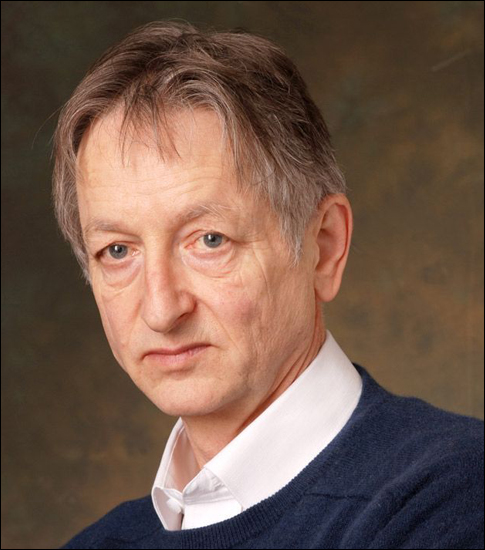Former CMU Computer Science Professor, Turing Winner Honored With Dickson Prize in Science
Thursday, March 3, 2022 - by Aaron Aupperlee

At a time when researchers had abandoned neural networks as a tool for achieving deep learning, Geoffrey Hinton persisted.
His work on deep learning has spanned decades and eventually led to the technology enabling a smartphone to translate foreign languages in near-real time.
Hinton, a former professor of computer science at CMU and an ACM Turing Award winner, received Carnegie Mellon University's 2021 Dickson Prize in Science. He was virtually welcomed back to the university Wednesday evening to receive the prize and deliver a lecture.
"Very few people have revolutionized a field," said Martial Hebert, dean of CMU's School of Computer Science, in remarks before Hinton's talk. "And that's what you have done with AI and with everything that touches AI. You are an example to all of us of how research should be conducted."
Hebert, Randal Bryant, an emeritus dean and professor in SCS, and Tom Mitchell, the Founders University Professor in SCS, nominated Hinton for the prize. Bryant and Mitchell joined Hebert in lauding Hinton as an inspiration to researchers across computer science.
Mitchell said memories of a course he taught alongside Hinton and Allen Newell in 1986 have stayed with him through the decades. Bryant said Hinton kept working on training neural networks when others walked away.
"You never gave up. You kept working away, and in 2006, you came up with a way to train deep neural networks and that sparked a revolution," Bryant said.
Hinton's lecture on fast weights explored the interesting computational properties that can be implemented by adding an overlay of weights that adapt and decay rapidly. These weights, both fast and slow, allow neural networks to more closely mimic properties of the brain, where neural activities change rapidly but the connections between neurons change slowly. His talk incorporated research he undertook at CMU in the 1980s and concluded with the limitations of current hardware that does not store weights in memory.
"Fast weights can act as a temporary memory while we're doing processing," Hinton said. "That will free up the neural activity for whatever it is we want to represent."
Despite the growing use of neural networks for deep learning, Hinton said that given ideal circumstances, he would have never pursued them and instead focused on something akin to symbolic AI. He said the only reason he kept trying to make learning work in neural nets was a thought that the brain must be onto something with them.
"If you've got one device that is very good at learning," Hinton said, referring to the brain, "It's sort of stupid not to look at it."
A recording of Hinton's lecture will be available on the university's Dickson Prize website.
Hinton was a professor in CMU's Computer Science Department from 1982 to 1987. He called himself lucky to have spent time at the university and to work with the talented researchers around him. In 2019, he shared the A.M. Turing Award, known as the Nobel Prize in computer science, with Yoshua Bengio and Yann LeCun for their revolutionary work on deep neural networks. Hinton is currently the chief scientific advisor at the Vector Institute and a vice president and engineering fellow at Google.
The Dickson Prize in Science was established out of the bequest of Dr. Joseph Z. Dickson, a Pittsburgh physician, and his wife, Agnes Fischer Dickson. It has been awarded annually since 1970 to recognize substantial achievements or sustained progress in the fields of the natural sciences, engineering, computer science or mathematics.
For more information, Contact:
Aaron Aupperlee | 412-268-9068 | aaupperlee@cmu.edu